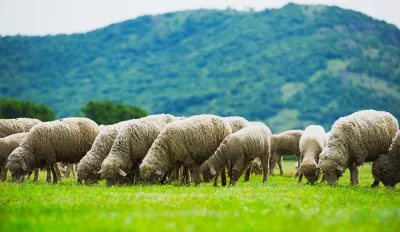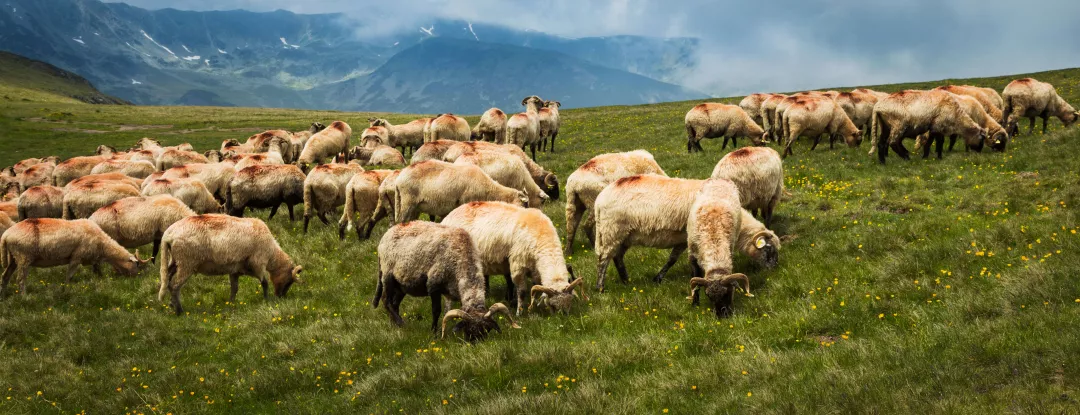General information
RDP Priority
- P2. Competitiveness
RDP Focus Area
- 2A: Farm’s performance, restructuring & modernisation
RDP Measure
- M04: Investments in physical assets
Beneficiary type
- Producer group / cooperative / farmer’s association
Summary
The ANIMALTIS Breeding Agricultural Cooperative is located on private land near the village of Pocruia of Gorj County in Romania. Local farmers had formerly struggled to sell their animals and other traditional ecological products but, over recent years, gained improved business acumen by joining forces through forming associations and cooperatives. Further progress of these positive developments was achieved through European Agricultural Fund for Rural Development (EAFRD) support. This project is an example of how investment in modernising a cooperative farm can not only improve business performance, but also contribute to changing the image of the agricultural industry to make it more attractive for younger generations to join the sector.
In 2024, the EAFRD-funded project was still supporting investments into a sheep fattening hall, administrative buildings, haystack, car scale, manure platform, drainable pool, water tank, and land fencing.
Results
- In 2024, the constructions and acquisitions were advanced and already mostly in operation. This included a fully functional feeding system for fattening the lambs during three fattening cycles/year. Lambs and sheep will then be exported in line with market demand, whereby the fattened rams go to Arab countries and the sheep to slaughterhouses in different EU countries.
- In terms of business growth, ANIMALTIS Agricultural Cooperative had 5 000 sheep and 10 000 lambs in 2024. At this time, the farm was managed by three permanent employees (FTE). A further three people are planned to be employed by the end of the project implementation (in 2026).

Promoter
ANIMALTIS Breeding Agricultural Cooperative (Crescătoria ANIMALTIS Cooperativă Agricolă)
Funding
Total budget: 1 733 846 (EUR)
EAFRD: 1 402 369 (EUR)
National/Regional: 247 477 (EUR)
Private/own: 84 000 (EUR)
Resources
Documents
Good Practice Report - Establishment and equipment of a cooperative zootechnical farm for sheep fattening
(PDF – 1.01 MB)
Links
Context
ANIMALTIS is a newly established sheep farm in the village of Pocruia, Gorj County, in Romania. The area is a traditional industrial area, located in a superb natural setting with great cultural heritage and traditions. In the past, the agricultural sector was burdened with fluctuations in market prices, a buyers-driven market to animal purchases and a general lack of regulation and transparency. This was particularly challenging for individual small-scale farmers. In 2021, six individual livestock farmers decided that a joint approach would be preferable and they formed Animaltis as a new, cooperative sheep breeding and fattening farm. Together, they had approximately 4 000 sheep and a great determination to succeed. They were successful in exporting their animals to Arab countries and a few years later also started exporting to Italy, Germany and the Netherlands. The increased demand required adjustments and inspired the farm owners to grow their business to around 10 000 sheep by 2026.
The farm members also understood that EAFRD funding was an excellent opportunity to support the development of their new farm and took this as an opportunity to secure an important project investment to help them achieve their business aspirations.
Objectives
The main objectives of the EAFRD-funded project were to modernise the animal husbandry farm across its primary production, conditioning and marketing tasks, thereby supporting the business's growth. The planned investments were to create the necessary farm infrastructure, equipment, machinery, feeding and transporting processes for the animals.
Specifically, the project aimed at increasing the business's added value by developing on-farm processing and direct marketing approaches to create and promote integrated food chains. Improved marketing was also planned to build and maintain new connections with trusted partners at the national and international levels.
Activities
The project activities included preparing the farmland (1 942.84 m2) and implementing all constructions and related installations on the farm. Across all stages, the project continuously addressed the capacity-building angles relating to competitive and modern farm management and relevant developments concerning marketing and direct sales.
Main construction activities include:
- An administrative office block (44.34 m2).
- A haystack as an open structure (200 m2).
- A porter's cabin (9.18 m2), plus vehicle weighting scale - concrete slab with roof and insulating panels (105.36 m2).
- A cabin/refrigerating box for temporary storage (6 m2).
- An animal fattening hall (1 639 m2) with 20 boxes for animals, of metal structure along with insulating panels, and concrete enclosures with skylight covered with retractable blinds.
- A water reserve basin (91.6 m2) waterproofed, with stainless steel lids for animal consumption.
- A drainable basin for the office (9.9 m2).
- A liquid and solid waste platform (468 m2) made of concrete with emptying/cleaning system.
- Cobblestone platforms (2 000 m2) to ensure access to all farm facilities.
Main results
- In 2024, the project was still in progress anticipating the completion of all tasks by 2026. However, a number of positive achievements were already accomplished at that stage. For example, the constructions and acquisitions were advanced and already mostly in operation. This included a fully functional feeding system for fattening the lambs during three fattening cycles/year. Lambs and sheep will then be exported in line with market demand, whereby the fattened rams go to Arab countries and the sheep to slaughterhouses in different EU countries.
- In terms of business growth, ANIMALTIS Agricultural Cooperative had 5 000 sheep and 10 000 lambs in 2024. At this time, the farm was managed by three permanent employees (FTE). A further three people are planned to be employed by the end of the project implementation (in 2026).
Key lessons
- The project demonstrates the success individual farmers, shepherds, and animal breeders can have when joining forces by forming associations or cooperatives. The pooling of resources and individual knowledge combined with hard work and common objectives can achieve very positive long-term results, particularly with the support of European rural funding programmes /funds over a relatively short time.
- The growing demand for mutton, especially from Arab countries, also provides opportunities for young Romanian sheep breeders. This creates real employment opportunities and shows younger generations that business opportunities exist in rural areas despite general misgivings about rural life. Since the employment crisis, many young people have already realised that an agricultural business can provide an agreeable life, providing job security and development potential. For example, animal husbandry has been transformed over recent years, with a new generation of breeders bringing new passion to livestock farming.
We had a lot of trouble at the beginning because our project was rejected. I appealed: for nothing! A document that was not recognised, although it was valid - a diploma from the Faculty of Agronomy in Bucharest. Finally, we managed to access the money, we paid designers, consultants, and now we are implementing our project.
